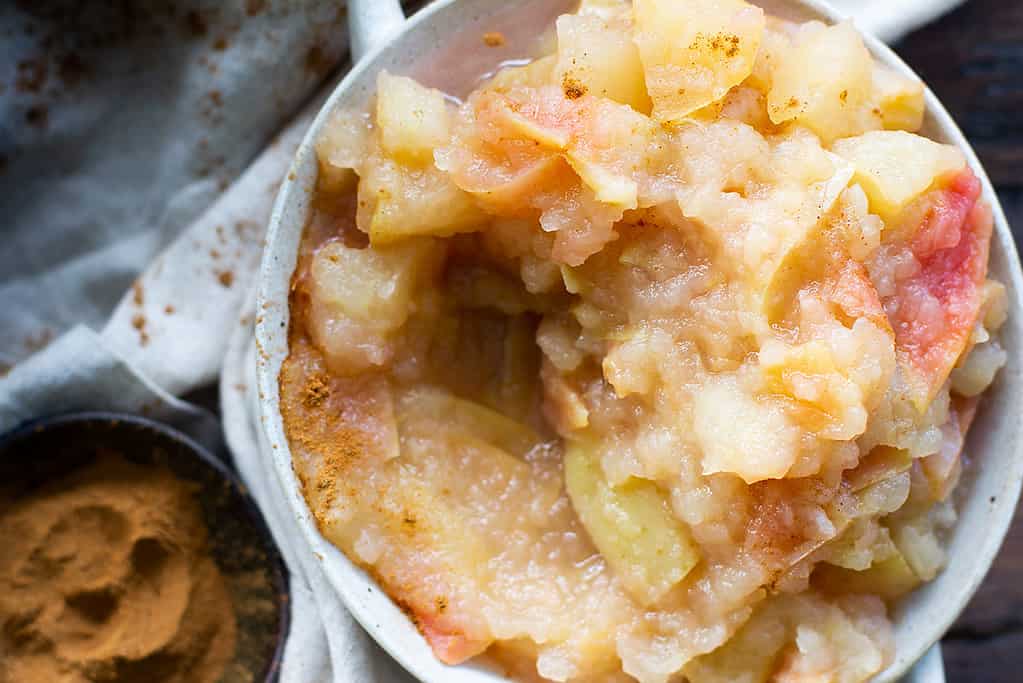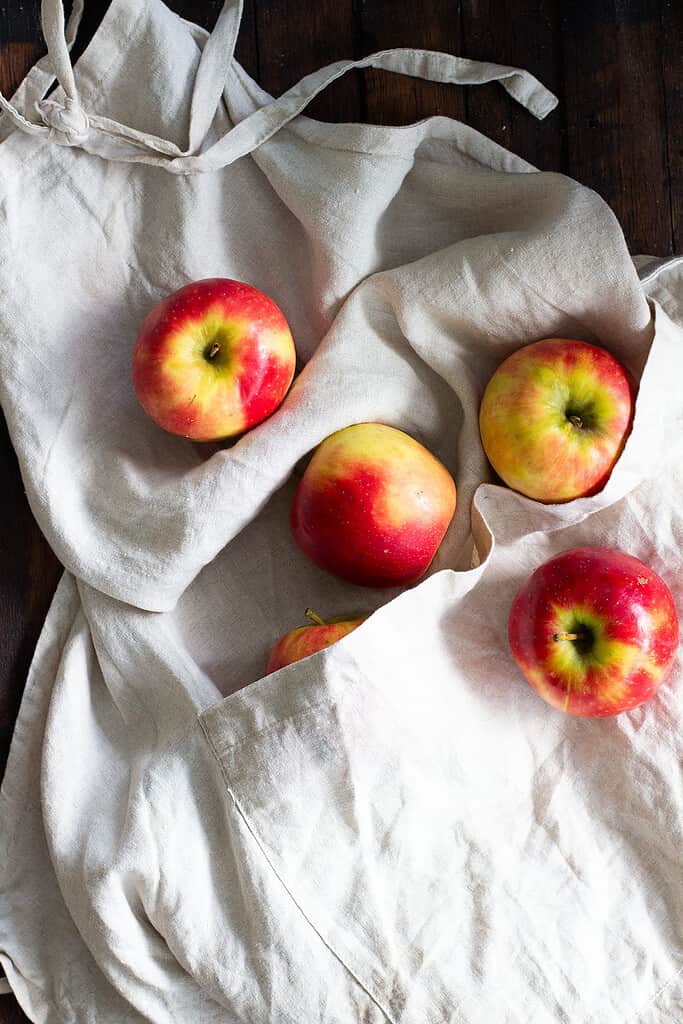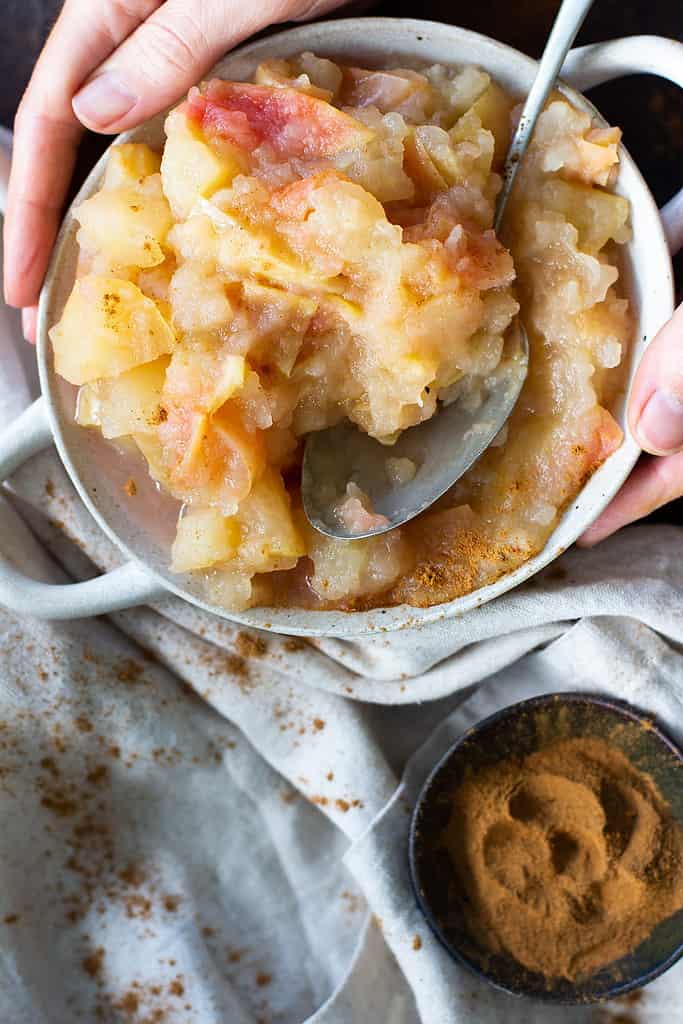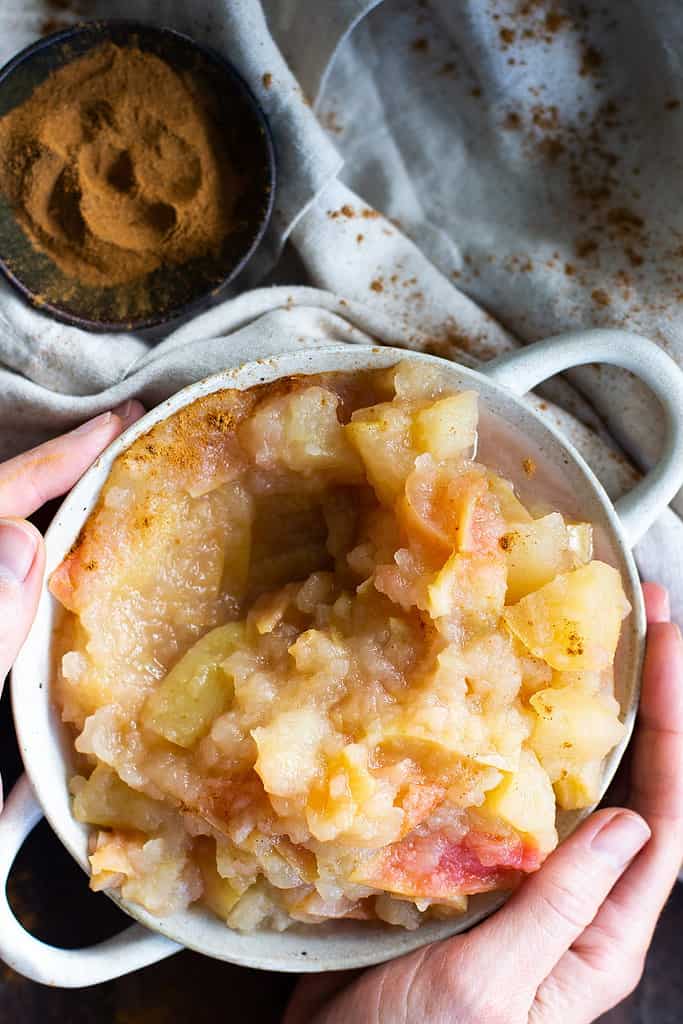
quick & easy sugar free stewed apple using two ingredients
Okay I’ve finally done it. I resisted for some time as I struggled with this being ‘recipe’, but too many of you have asked for the recipe alongside clients often asking for instructions on how to make stewed apples. So I bring you my recipe for stewed apples.
This is super easy and basic to do. In my kitchen I often add other flavours (and I have included some ideas below for you) but it’s important to have a base recipe that you can use to start with if you are new to stewing apples. I also wanted a simple base recipe that showed you that you do not need to add any form of sweetener. The apples are super sweet on their own so please don’t go adding maple or honey or anything! It just doesn’t need it.
So we are left with two simple ingredients. Apples & water. All you need to do from here is prepare them in the correct way and within 20 minutes you will have some lovely steaming hot stewed apples ready to use. Easy!

why are stewed apples good for your gut?
So why are we always banging on about stewed apples at The JCN Clinic? If you have had anything to do with us as JCN you will know that we are big on our stewed apples. The reason for this is that apples (especially the red delicious variety) are a rich source of plant tannins. In fact apples are extremely rich in polyphenols and research suggest that some of these potent antioxidants found in apples can protect against oxidative stress – a major contributor to ill health. (Carrasco-Pozo et al, 2010)
Polyphenols act as potent anti-inflammatory agents, antioxidants and help modulate gut bacteria species, all highly beneficial for gut restoration and building of mucosal integrity. More specifically stewed apples have been hypothesised to increased regulatory T cell promotion in the digestive tract consequently changing dendritic cell regulatory function, thereby increasing oral tolerance. Think of dendritic cells like cells with long arms that reach through the intestinal wall to taste what is passing by inside the intestinal tract in the mucosal tissue. This increased ‘oral tolerance’ means these dendritic cells are more likely to provide a tolerance to food proteins instead of an over reactivity.

Apples are also one of the richest source of pectins. Pectins are a prebiotic, specifically a plant cell wall polysaccharide that is used by bacteria within the gut as a fuel source. As humans we lack the capacity to digest them however the bacteria that reside within our microbiome digest pectins happily creating important compounds called short chain fatty acids (SCFA) which you can read more about here alongside other important metabolites.
Pectins also have the ability to ‘feed’ particular bacteria genus within our microbiome. In fact research has even looked at the different types of pectin and how they influence the growth patterns of bacteria in our gut in conjunction with the SCFA they produce, seeing a variation between the pectin in apples to the pectin in citrus. I love how highlights as always the importance of diversity in our diet.
Studies have also shown that pectin can help lactobacillus probiotics adhere to the intestinal wall more effectively. (N larsen et al 2019) Pectins have additionally been shown to bind to receptors called Toll like receptors and inhibit pro-inflammatory pathways. ( N.M. Sahasrabudhe, et al, 2019)
Like what you’re seeing? Subscribe for new recipes and nutrition tips every week!

what to add to stewed apple
Now you know how to make stewed apples, you can flavour up them up in a variety of ways. I wanted to give you a base recipe here but its very common to add additional dry spices and herbs to the apples as they stew. Just ensure you take the spice pieces out at the end if they are whole pieces like cloves and cinnamon sticks. Some delicious add ins to stewed apple are:
- Cinnamon – either as the powder (1 heaped teaspoon) or by adding in a whole cinnamon stick as the apples stew
- Cloves – again, either ground cloves (1/2 teaspoon) or add whole cloves (1 teaspoon) in as the apples stew.
- Fresh rosemary & cinnamon – these two complement each other nicely so add in 1 stick cinnamon and 1 freshly cut stem of rosemary.
- Star anise – add in 2 star anise as the apples stew
- Vanilla – and 1 tsp vanilla extract or 1 vanilla pod cut down the centre.
Now the above can also be mixed and matched together to create even more adventurous flavours. Think of cinnamon, cloves and star anise or rosemary, vanilla and cloves. Play around with the flavours that you like for that finishing touch.
As far as the finished product, stewed apple is very versatile. It can be as simple as a snack on its own, or drizzled with some coconut cream for some extra pizazz. It can be a topper to pancakes and to toast instead of the classic sliced banana. It can also be used in baking as a substitute for banana like in my Vegan Coconut Bread or Banana Muffins. Oh, and of course I cannot recommend stewed apples as the filling to my Apple Pie. Glorious. xo
Need personalised nutrition advice catered to your needs?
If you are after personalised nutrition advice and dietary planning individualised to your health and dietary needs then contact us at The JCN Clinic with your enquiry. We are always happy to answer any questions you have!
stewed apple recipe
- serves
- makes 6 cups
- preparation time
- 10 min
- cooking time
- 20 min
ingredients
- 5 medium apples / approx. 900g (red delicious are ideal, but any will do)
- 1/2 cup water
method
This recipe is a simple base that you can add extra flavours to as noted above in the blog post. Double, triple or quadruple the recipe for batch cooking.
Start by cutting the apples in half and then into quarters.
Use a sharp knife to remove the core from each apple quarter. All you want to remove is the seeds and the tough bits, thats it so don’t go crazy.
Now take each apple quarter and cut into three pieces lengthways. Then cut those three pieces again into an additional three pieces down the length of the apple piece, resulting in three rough shaped cubed pieces.
Continue cutting the apple quarters like this until they are all cut up and then place them into a large saucepan with the water and the lid on.
Turn the saucepan onto a low to moderate heat and bring the water to the boil, then turn to a low simmer. The idea is for the simmering water in the bottom to steam and stew the apples down.
Allow the apples to simmer away and stew for around 20 minutes, checking every 5 minutes and stirring to make sure they are not sticking to the bottom. If all the water has disappeared and they are starting to stick then add a little more water. However, once the apple stew down and create their own liquid you will find this is enough to stop them from sticking to the bottom.
Once the stewed apples are ready they will be lovely and soft. Turn off the heat and allow to cool before placing in a sealed container in the fridge. The stewed apples will last for 5 – 6 days in the fridge, otherwise freeze.
nutritional information for stewed apple
- You can read in the blog post above about the benefits of polyphenols & pectins found in apples. However, it is also worth noting that an apple with the skin provides around 20% of your daily fibre needs and contain a high amount of Vitamin C. Apples also provide a moderate amount of our other vitamins and minerals but their true stand out really does come to the forefront with the phytochemical constituents mentioned in the blog.
Jessica Cox is a qualified practicing Nutritionist with a Bachelor Health Science (Nutrition) and over 15 years of clinical experience. She is the founder and director JCN Clinic, published author and established recipe developer. Jessica is well respected within health and wellness space for her no fad approach and use of evidence-based nutrition.





